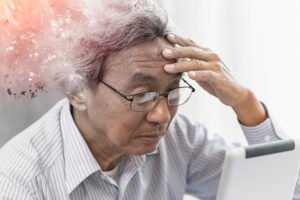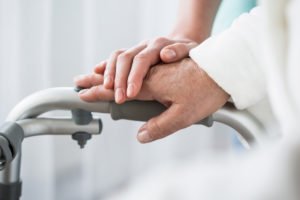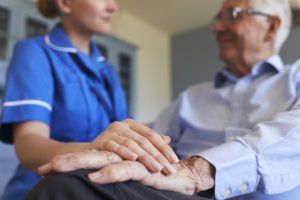
Brain damage is the destruction or degeneration of brain cells, often resulting from a traumatic brain injury (TBI). According to the Centers for Disease Control and Prevention (CDC), in 2014, there were nearly 3 million TBI emergency room visits, hospitalizations, and deaths.
According to John Hopkins Medicine, depending on the severity of the injury, symptoms of brain damage can be mild to severe. Some symptoms of brain damage are:
- Cognitive deficits, including confusion, memory problems, amnesia, problem-solving deficits, affected judgment, and loss of sense of time and space.
- Motor deficits, such as poor coordination and balance, paralysis, weakness, tremors, difficulty swallowing, and decreased endurance.
- Perceptual or sensory deficits like changes in hearing, vision, smell, touch, and taste, loss of sensation, or heightened sensation.
- Communication and language deficits, including difficulty speaking and choosing words, difficulty identifying objects and their function, and problems with reading, writing, and numbers.
- Functional deficits, like difficulty with day-to-day tasks, such as dressing, bathing, eating, driving, and shopping.
- Social difficulties, such as difficulty making friends and understanding and responding to normal social interactions.
- Regulatory disturbances may present as changes in sleeping and eating habits, incontinence, fatigue, dizziness, and headaches.
- Personality or psychiatric changes, including irritability, aggression, anxiety, depression, and apathy.
- Traumatic epilepsy, which causes seizures, can be a symptom of more serious TBIs.
Causes and Complications
Brain damage often is caused by a blow to the head or body, resulting in bruising of the brain and damage to the brain tissue and blood vessels. According to the Mayo Clinic, falls are, overall, the most common cause of TBI, especially in older adults and children.
Other causes of brain damage may include:
- Falls
- Car accidents
- Violence, abuse, and assaults
- Sports injuries
- Combat injuries
- Explosive blasts
Some brain injuries are caused by a direct impact to the brain, while others occur when the brain is jolted and knocked against the skull.
According to ScienceDaily, not all brain damage is caused by TBI. Brain damage also can be caused by a shortage of oxygen, poisoning, infection, stroke, aneurysm, and neurological illnesses.
For a free legal consultation, call 800-712-9119
How Is Brain Damage Treated?
Johns Hopkins Medicine states that studies show once brain cells are destroyed or damaged, they generally do not regenerate. However, people who suffer brain damage can recover. Sometimes, other areas of the brain make up for injured tissue, especially in younger patients. In other cases, the brain can learn to function around the damage.
Some symptoms of brain damage are improved with rehabilitation. Rehab can help rebuild mobility skills, communication and socialization skills, and cognitive skills. Rehabilitation can also help patients with the skills required to care for themselves, such as grooming, bathing and dressing.
Nursing Home Abuse
If your loved one lives in a nursing home and has suffered brain damage, it could be a sign of serious issues with their care. Some of the causes of brain damage, like falls, also are signs of nursing home abuse. Falls can point to a lack of mobility assistance, and TBIs may be the result of physical abuse. According to the CDC, abuse also can be emotional, sexual, and financial. Neglect, or the failure to meet a resident’s basic needs, also is a form of abuse.
Click to contact our personal injury lawyers today
What Are Other Signs of Nursing Home Abuse?
If your loved one has unexplained injuries, like cuts, bruises, and burns, or has experienced excessive falls or accidents, it could be a sign of nursing home abuse. Malnourishment, dehydration, poor hygiene, and bedsores are other warning signs.
Changes in your loved one’s behavior may also indicate abuse. Be alert for signs of depression, acting withdrawn, or displaying violent or aggressive behavior.
Finally, there may be signs within the nursing home itself. Staff should be calm, friendly, and knowledgeable. A high staff turnover, disorganized or frantic staff, or staff who avoid answering questions about your loved one’s care all are red flags.
Complete a Free Case Evaluation form now
What Should You Do if You Believe Your Loved One Is Being Abused?
If you suspect your loved one may be suffering from nursing home abuse, you should file a report with the nursing home’s administration. Elder abuse is illegal, so you may also want to make a report with your local law enforcement agency.
You can reach out to the agency that regulates and licenses nursing homes in your state to make a complaint. Generally, this is the department of health. Adult protective services, or an agency that advocates against elder abuse, may also offer help.
Finally, you have the option to seek the help of an attorney. A lawyer with Ben Crump Law, PLLC can help you determine who or what caused your loved one’s brain damage. A lawyer can help you seek compensation for your loved one’s injuries. For more information, contact Ben Crump Law, PLLC at 800-959-1444.
Call or text 800-712-9119 or complete a Free Case Evaluation form








